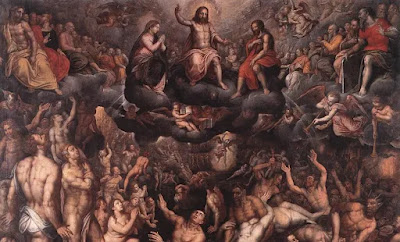Most of traditionalist piety is commendable: dressing the part for Holy Mass, keeping silence, frequent confession, recollection after Communion, etc. But there is one thing that I hear somewhat often, and which I bristle at interiorly, and that is a form of trad 'humble-bragging' about the personal expectation of "doing time" in Purgatory after death.
The mentality goes something like this: emboldened by the words of heavy-hitting saints such as St. John of the Cross, St. Theresa of Avila, St. John Vianney, and others who affirmed how narrow the path to perfection is, the Catholic aligns himself with this traditional view of the fewness of the saved. They are aware, in reactionary fashion, of the presumption rampant in the Novus Ordo churches that "Grandma is in Heaven now," or to the teaching of universal salvation that "Hell is empty" purported by more liberal theologians. There is an inherent tendency to overcompensate as a means of differentiation--if in the NuChurch, everyone is saved, then in the TruChurch, almost no one is. We then expect to be in purgatory when we die as a matter of pious, measured realism.
Now, we know our Lord says in scripture says that the way is narrow, and few find it (Mt 7:14). But if you have, in fact, found the Way, and God gives you the grace you need to be saved, and wants to forgive your sins before you even ask, and wants you to trust Him as a loving Father--why is it that we don't take Him at his word? Is it maybe because we don't, in fact, trust Him?
I think when Our Lady of the Miraculous Medal re-converted my wife and I, she included a "bonus gift": for around the same time I went from not being able to stand the insufferable piety of Jesus' "Little Flower" to suddenly finding refuge in St. Therese's Little Way.
St. Therese was 100% orthodox in belief while appearing unorthodox in praxis.
When she found out that her novices talked occasionally that they would probably have to expect to be in Purgatory, she reminded them that we in fact offend God when we don't trust enough that we would (or could) get to heaven right after dying. She corrected them saying:
“Oh! How you grieve me! You do a great injury to God in believing you’re going to Purgatory. When we love, we can’t go there.”
(RECOLLECTION, SR. MARIE OF THE EUCHARIST LETTER TO HER FATHER, ISIDORE GUÉRIN 8 JULY 1897)
While still only a novice, the saint commented about this with one of the sisters, Sr. Maria Philomena, who believed in the near impossibility of going to heaven without passing through purgatory:
"You do not have enough trust. You have too much fear before the good God. I can assure you that He is grieved over this. You should not fear Purgatory because of the suffering there, but should instead ask that you not deserve to go there in order to please God, Who so reluctantly imposes this punishment. As soon as you try to please Him in everything and have an unshakable trust He purifies you every moment in His love and He lets no sin remain. And then you can be sure that you will not have to go to Purgatory."
There has always been this tension in the Church of the emphasis on the humanity of Jesus versus his divinity; the fear of God versus the love of God; God as just Judge versus God as the Good Shepherd. Maybe it is because I know my past, my sin, my weakness and incapacity to anything great which now attracts me to the Little Way of trust; of magnifying my own dependence in recollection, rather than my deficiencies that put all the onus to be saved on my efforts. God is big, capable, willing, and worthy to be trusted. He can do the heavy lifting. Why, then, do we think everything rests on us to accomplish what He can do effortlessly?
I know it sounds harsh, but it's almost akin to a kind of trad "humble-bragging" to assert this "I'm going straight to Purgatory when I die" mentality. If I had to speculate as to the root of this psychology, it may very well be rooted in pride, which is according to many priests is the thorn in the side for trads. If people want to persist in this, that is their prerogative. But they should also not impede those who like Therese, see everyone else taking the stairs to Heaven, and realize their incapacity to follow given the ardor, resolving to take the elevator instead.
When you think about the constant use of paradox and parables by Christ that turned conventional religious thinking of the time on its head, you start to see that maybe St. Therese's status as a Doctor of the Church is warranted. It is so "radical", this abasement to simply trust, love, and surrender, that it flies in the face of conventional piety and rigor.
It is, in effect, "another way" to find our way home for those of us too weak, too infirmed, or too spiritually simple to go the conventional route. It gives those of us who feel otherwise shut out from the possibility of Heaven....hope. Hope that we can be saved not by our strength, but by our weakness; not by our great personal feats, but in our trust in the One who can do the impossible.
Although it can be trad-fashionable to assume we are all going to end up in Purgatory or worse, Hell, I'd rather abase myself in poverty to trust with the Little Flower, in the spirit of her words, "what pleases Him is that He sees me loving my littleness and my poverty, the blind hope that I have in His mercy… That is my only treasure...why should this treasure not be yours?"


